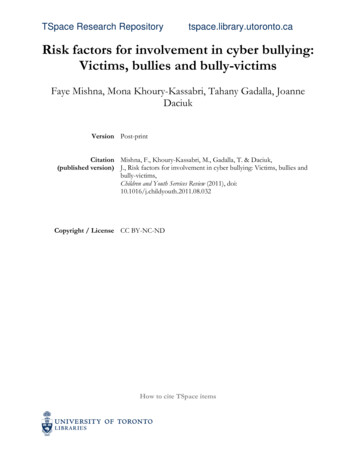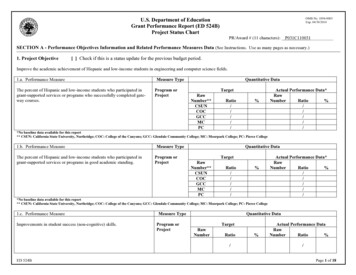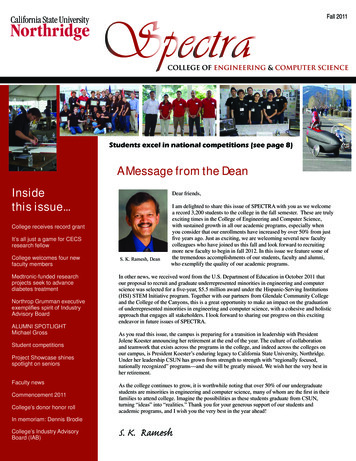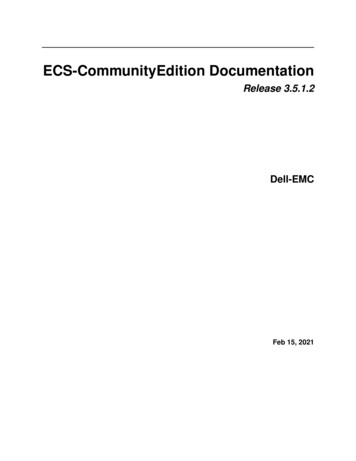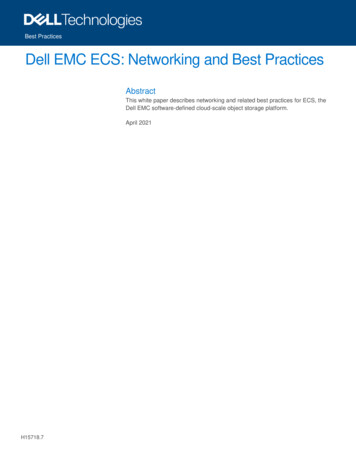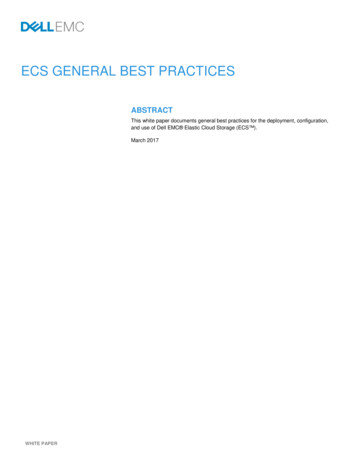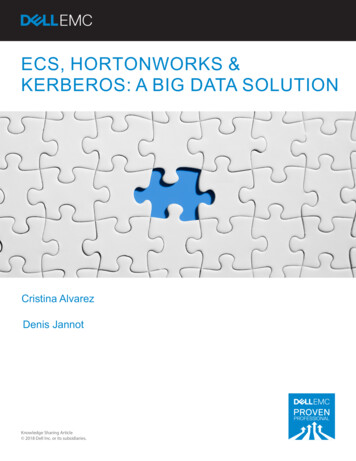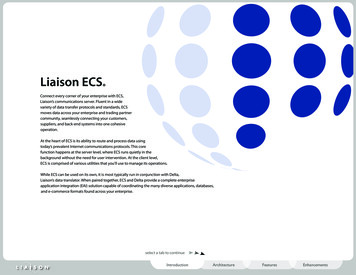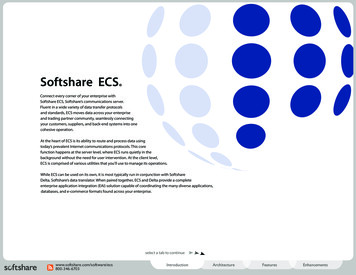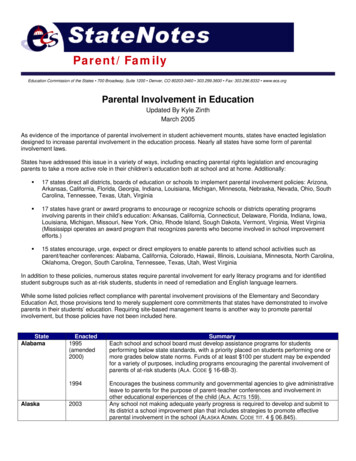
Transcription
Parent/FamilyEducation Commission of the States 700 Broadway, Suite 1200 Denver, CO 80203-3460 303.299.3600 Fax: 303.296.8332 www.ecs.orgParental Involvement in EducationUpdated By Kyle ZinthMarch 2005As evidence of the importance of parental involvement in student achievement mounts, states have enacted legislationdesigned to increase parental involvement in the education process. Nearly all states have some form of parentalinvolvement laws.States have addressed this issue in a variety of ways, including enacting parental rights legislation and encouragingparents to take a more active role in their children’s education both at school and at home. Additionally:17 states direct all districts, boards of education or schools to implement parental involvement policies: Arizona,Arkansas, California, Florida, Georgia, Indiana, Louisiana, Michigan, Minnesota, Nebraska, Nevada, Ohio, SouthCarolina, Tennessee, Texas, Utah, Virginia17 states have grant or award programs to encourage or recognize schools or districts operating programsinvolving parents in their child’s education: Arkansas, California, Connecticut, Delaware, Florida, Indiana, Iowa,Louisiana, Michigan, Missouri, New York, Ohio, Rhode Island, Sough Dakota, Vermont, Virginia, West Virginia(Mississippi operates an award program that recognizes parents who become involved in school improvementefforts.)15 states encourage, urge, expect or direct employers to enable parents to attend school activities such asparent/teacher conferences: Alabama, California, Colorado, Hawaii, Illinois, Louisiana, Minnesota, North Carolina,Oklahoma, Oregon, South Carolina, Tennessee, Texas, Utah, West VirginiaIn addition to these policies, numerous states require parental involvement for early literacy programs and for identifiedstudent subgroups such as at-risk students, students in need of remediation and English language learners.While some listed policies reflect compliance with parental involvement provisions of the Elementary and SecondaryEducation Act, those provisions tend to merely supplement core commitments that states have demonstrated to involveparents in their students’ education. Requiring site-based management teams is another way to promote parentalinvolvement, but those policies have not been included maryEach school and school board must develop assistance programs for studentsperforming below state standards, with a priority placed on students performing one ormore grades below state norms. Funds of at least 100 per student may be expendedfor a variety of purposes, including programs encouraging the parental involvement ofparents of at-risk students (ALA. CODE § 16-6B-3).1994Encourages the business community and governmental agencies to give administrativeleave to parents for the purpose of parent-teacher conferences and involvement inother educational experiences of the child (ALA. ACTS 159).Any school not making adequate yearly progress is required to develop and submit toits district a school improvement plan that includes strategies to promote effectiveparental involvement in the school (ALASKA ADMIN. CODE TIT. 4 § 06.845).2003
StateEnacted2003Districts required to submit district improvement plans to the state department ofeducation are to develop plans that include strategies to promote effective parentalinvolvement in the school (ALASKA ADMIN. CODE TIT. 4 § 06.850).1990(amended2004)Districts must annually file with the department of education, and make available to thepublic, a report that establishes district goals and priorities for improving education inthe district. The report must include a plan for achieving district goals and priorities anda means of measuring the achievement of district goals and priorities. Districts mustmake efforts to encourage students, parents, teachers and other members of thecommunity to participate in the preparation of the report. The report must include adescription – including quantitative and qualitative measures – of student, community,business and parental involvement in student learning (ALASKA STAT. § 14.03.120).Local governing boards must develop a policy to promote the involvement of parentsand guardians. Policies must include (1) a plan for parent participation in the schooldesigned to improve parent and teacher cooperation in areas such as homework,attendance and discipline, (2) procedures by which parents may learn about the courseof study for their children and review learning materials and (3) procedures by which aparent may withdraw their child from activities the parent objects to.Adopted policies may also include:1. A plan by which parents will be made aware of the district's parental involvementpolicy and the provisions of this section, including:(a) Rights under the family educational rights and privacy act of 1974 relating toaccess to children's official records.(b) The parent's right to inspect the school district policies and curriculum.2. Efforts to encourage the development of parenting skills.3. The communication to parents of techniques designed to assist the child's learningexperience in the home.4. Efforts to encourage access to community and support services for children andfamilies.5. The promotion of communication between the school and parents concerning schoolprograms and the academic progress of the parents' children.6. Identifying opportunities for parents to participate in and support classroominstruction at the school.7. Efforts to, with appropriate training, support parents as shared decision makers andto encourage membership on school councils.8. The recognition of the diversity of parents and the development of guidelines thatpromote widespread parental participation and involvement in the school at variouslevels.9. The development of preparation programs and specialized courses for certificatedemployees and administrators that promote parental involvement.10. The development of strategies and programmatic structures at schools toencourage and enable parents to participate actively in their children's education (ARIZ.REV. STAT. § y2003Principals of every school offering instruction in preschool programs, kindergartenprograms or any combination of grades one through 12 are responsible for distributinga parental satisfaction survey to the parent of every child enrolled at the school. Theparental satisfaction survey must be distributed at least once each year and must bedistributed as part of the regular parent communication correspondence (ARIZ. REV.STAT. § 15-353).All public schools and districts, in collaboration with parents, must establish a parentalinvolvement plan, including programs and practices that enhance parental involvementand reflect the specific needs of students and their families. Plans will involve parents ina variety of roles, be comprehensive and coordinated in nature, recognize thatcommunication between home and school should be regular, two-way and meaningful,promote and support responsible parenting, acknowledge that parents play an integralrole in assisting student learning, welcome parents into the school and seek parentalEducation Commission of the States700 Broadway, Suite 1200Denver, CO 80203-3460 Page 2 303.299.3600Fax: 303.296.8332www.ecs.org
StateCaliforniaEnactedSummarysupport and assistance, recognize that parents are full partners in the decisions thataffect children and family and recognize that community resources strengthen schoolprograms, family practices and student learning (ARK. CODE ANN. § 6-15-1702).2003Requires parental authorization for surveys or questionnaires administered to studentsrequesting any personally identifiable information (ARK. CODE ANN. § 6-18-1303).1983(amended1995, 1999)Local matching funds are required for the parents-as-teachers program. Grantees maysubcontract with other agencies for operation of parents-as-teachers programs. Noschool district nor any parent or guardian will be required to participate in the parentsas-teachers program (ARK. CODE ANN. § 6-10-109).Parents and guardians have the right, and should have the opportunity, to participate inthe education of their children. Parental rights include the ability, within a reasonableperiod of time following a request, to observe the classroom in which their child isenrolled or meet with their child’s teachers and principal. Parents also are to be notifiedin a timely manner regarding unexcused absences by their child and standardized testresults. Additionally, parents are to have the opportunity to work together in a mutuallysupportive and respectful partnership with schools. Each school district must developand adopt jointly with parents, a policy that outlines the manner in which parents,school staff and pupils may share the responsibility for continuing the intellectual,physical, emotional, and social development and well-being of students (CAL. EDUC.CODE § 51101).1998 (lastamended2004)1990Declares that parental involvement and support in education is an integral part ofimproving academic achievement. Directs school districts to establish a parentinvolvement program for each school that receives funds under the federal Elementaryand Secondary Education Act and to adopt a policy on parental involvement for allschools not receiving such funds. Programs must include at least the following: (1)Procedures to ensure that parents are consulted and participate in the planning,design, implementation and evaluation of the program. (2) Regular and periodicprograms throughout the school year that provide for training, instruction andinformation. (3) An annual statement identifying specific objectives of the program. (4)An annual review and assessment of the program's progress in meeting thoseobjectives. Parents must be informed of the assessment and be given a copy uponrequest (CAL. EDUC. CODE § 11500 — 11506).1992 (lastamended2002)In order to be approved, charter school petitions must detail the governance structure ofthe school, including, but not limited to, the process to be followed by the school toensure parental involvement (CAL. EDUC. CODE § 47605).1990Prohibits employers with at least 25 employees from firing or in any way discriminatingagainst an employee for taking off up to 40 hours each year to participate in schoolrelated activities, subject to a limitation of eight hours in any calendar month.Employees must give reasonable notice to their employers and may be required toprovide proof of attendance. Employees must utilize existing vacation, personal leaveor compensatory time off, unless otherwise provided for by a collective bargainingagreement. An employee also may utilize time off without pay for this purpose.Employees discharged, threatened with discharge, demoted, suspended or in any othermanner discriminated against for taking time off to participate in school activities isentitled to reinstatement and reimbursement for lost wages and work benefits (CAL.LAB. CODE § 230.8).1995Prohibits schools from administering tests, questionnaires, surveys or examinationswhich contain questions about the student’s or parents’ beliefs or practices in sex,family life, morality and religion to students between 1st and 12th grade, unless theparent is notified of the test in writing and gives written permission (CAL. EDUC. CODE §51513). Prohibition also applies to exams given as part of the statewide assessmentprogram. Parents may request in writing that their child be excused from statewideEducation Commission of the States700 Broadway, Suite 1200Denver, CO 80203-3460 Page 3 303.299.3600Fax: 303.296.8332www.ecs.org
utSummaryassessments (CAL. EDUC. CODE § 60614 — CAL. EDUC. CODE § 60615).Establishes the Nell Soto Parent/Teacher Involvement program, which awards grants toschools in which a majority of teachers and parents agree to strengthen communicationbetween schools and parents as a means of improving student achievement (CAL.EDUC. CODE § 51124).The Closing the Achievement Gap Commission is created to address effectiveapproaches to closing the achievement gap in elementary and secondary education.The Commission will study a number of issues, including parent involvement and on orbefore December 1, 2005 issue a final report to the state board and educationcommittees of the Senate and House of Representatives (COLO. REV. STAT. § 22-7612).1996Supports parental involvement in the public schools and encourages parents to visittheir children’s classrooms at least once a semester. Encourages businesses with morethan 10 employees to allow each employee at least two hours per school semester toattend parent-teacher conferences, special presentations and school-relatedcommittees. Also encourages the recognition of businesses that show theircommitments to children and education through their understanding of the importanceof parental involvement (COLO. S.J.R. 15).1996The Colorado Basic Literacy Act mandates that all students read at the 3rd-grade levelbefore being promoted to the 4th grade. Students not reading at grade level receive anIndividual Literacy Plan or are enrolled in an intensive literacy program. The parents ofa K-3 student found to be reading below grade level must cooperate with the child'steacher and the school administration in the creation of an individual literacy plan.Among the mandatory components of the plan is a promise from the child's parents toput into place "a home reading program to support and coordinate with the school."(COLO. REV. STAT. § 22-7-503 — COLO. REV. STAT. § 22-7-507).1990(amended1992, 2002)School districts are encouraged to include instruction in their local comprehensivehealth programs that promotes parental involvement, abstinence, fosters positive selfconcepts, develops decision-making skills and provides mechanisms for coping withand resisting peer pressure (COLO. REV. STAT. § 22-25-106).1988Preschool classes are to be supplemented by teaching activities in the home betweeneach student and the student's parent. School districts must provide the parent with thebooks and other materials necessary to carry out such a teaching plan. No child will beaccepted into a preschool program unless one or more parent accepts theresponsibilities, and failure to fulfill the responsibilities will result in the child’s dismissal(COLO. REV. STAT. § 22-28-110).Full-day kindergarten programs participating in the early reading success grant programmust provide for parental involvement. Proposals for intensive early interventionreading programs including after-school and summer programs must provide forparental involvement and ensure that parents have access to information on strategiesthat may be used at home to improve pre-reading or reading skills (CONN. GEN. STAT. §10-265F).19981998Directs each local and regional board of education to create and implement a threeyear plan to raise the level of reading skills of students in grades K-3. Plans mustinvolve parents in helping eliminate their child's reading problems, including arequirement that the district "provide information to parents on strategies that can beused at home to improve the child's language development, prereading or readingskills” (CONN. GEN. STAT. § 10-221H — CONN. GEN. STAT. § 10-221M).1997The development of school readiness programs seeks to strengthen the family throughthe encouragement of parental involvement in a child’s development and education(CONN. GEN. STAT. § 10-16o).Education Commission of the States700 Broadway, Suite 1200Denver, CO 80203-3460 Page 4 303.299.3600Fax: 303.296.8332www.ecs.org
StateEnacted1984(amended1997)1998DelawareDistrict ofColumbiaDirects the state board of education to develop a program to encourage local andregional boards of education to develop and implement plans to involve parents ofstudents in the educational process. Programs must provide for regular contact with allparents, including opportunities for parents to meet with their children's instructors forthe purpose of reviewing the curriculum of their child's program, and develop strategiesfor parents to actively assist in the educational process. Programs must also includethe development of written materials designed to familiarize parents with their child'scurriculum and to detail specific activities parents and students may undertake togetherto enrich the child's education experience and development (CONN. GEN. STAT. § 104G).Among the most important elements of effective parental and family involvement ineducation are communication, effective parenting skills, parental involvement in studentlearning, volunteerism, school-based decision making and collaboration with thecommunity. The parents' declaration of responsibilities is to be developed and kept upto date with the Delaware State Congress of Parents and Teachers and will identifyresponsibilities for parents and families as well as the responsibilities public schoolshave in helping parents meet such responsibilities. The department of educationencourages school districts and schools to adopt the declaration as local policy (DEL.CODE ANN. TIT 14, § 157).2001The engineering and applied science recruitment fund is intended to increase thenumber of minorities and women enrolled in engineering and science at postsecondaryeducation institutions. Programs approved for funding must meet certain criteria,including the encouragement of parental involvement (DEL. CODE ANN. TIT 14, § 3464).1996Schools applying for school improvement implementation grants must have plans thatinclude comprehensive school improvement goals tied to state and local academicperformance standards and strategies to achieve these and other goals identified bythe school, including staff development and parental involvement (DEL. CODE ANN. TIT14, § 806).The District’s long-term reform plan encourages parental involvement in all schoolactivities, especially parent-teacher conferences (D.C. CODE ANN. § 38-1801.01).19961996FloridaSummary2003Charter schools are required to report annually on the types and amounts of parentalinvolvement in their school. These reports are to be made available to the public (D.C.CODE ANN. § 38-1802.04).The Family and School Partnership for Student Achievement Act is designed to provideparents with specific information about their child’s educational progress,comprehensive information about their choices and opportunities for involvement intheir child’s education and a framework for building and strengthening partnershipsamong parents, teachers, principals, district school superintendents and otherpersonnel (FLA. ANN. CODE § 1002.23).2002(amended2003)Each district school board is required to operate a public information and parentalinvolvement program aimed at strengthening family involvement and empowerment.Program rules are to be developed in collaboration with school administrators, parents,teachers and community partners (FLA. ANN. CODE § 1001.42).2002The parents of limited English proficient students have the right to parental involvementin the English for Speakers of Other Languages (ESOL) program (Fla. Ann. Code §1002.20)."2002A parent whose child attends a private school through the Opportunity ScholarshipProgram, or the John M. McKay Scholarship for Students with Disabilities Program,must adhere to that private school’s parental involvement requirements unless excusedby the school for illness or other good cause (FLA. ANN. CODE § 1002.38 FLA. ANN.CODE § 1002.39).Education Commission of the States700 Broadway, Suite 1200Denver, CO 80203-3460 Page 5 303.299.3600Fax: 303.296.8332www.ecs.org
StateGeorgiaEnactedSummary2001Requires department to compile and examine reading programs used in Florida schoolsand determine these programs' effectiveness as well as their per-student cost. Thedepartment is also mandated to propose "statewide standards for reading programs"founde
related activities, subject to a limitation of eight hours in any calendar month. Employees must give reasonable notice to their employers and may be required to provide proof of attendance. Employees must utilize existing vacation, personal leave or compensatory time off, unless oth
